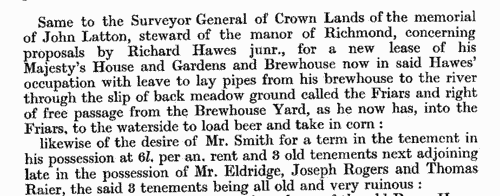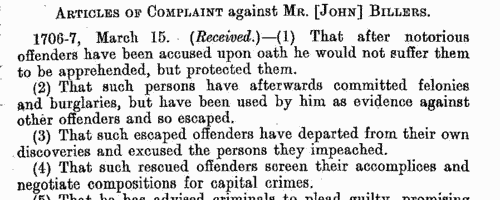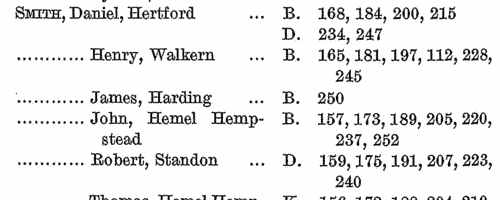Our indexes include entries for the spelling collings. In the period you have requested, we have the following 586 records (displaying 21 to 30):
Treasury Books
(1700-1701)
Records of the Treasury administration in Britain, America and the colonies, from October 1700 to December 1701.
| Sample scan, click to enlarge

|
Official Papers
(1700-1702)
The State Papers Domestic cover all manner of business relating to Britain, Ireland and the colonies, conducted in the office of the Secretary of State as well as other miscellaneous records. Includes lists of passes to travel abroad. This abstract covers the period from 1 April 1700 to 4 March 1702, with an appendix of items dating back as early as 1689.
| Sample scan, click to enlarge

|
Harley family papers
(1690-1708)
This collection of letters and papers is particularly interesting in that it includes a file of petitions and memorials to queen Anne from 1704 to 1708, and a similar file of petitions to Robert Harley in his post as Secretary of State during the same years. The collection includes a few items earlier than 1690. Mostly relates to Britain and Ireland. | Sample scan, click to enlarge

|
Hertfordshire badgers, drovers and kidders
(1700-1710)
This is a list of licences granted to badgers (B.), drovers (D.) and kidders (higlers) (K.) in the Hertfordshire sessions records. The numbers refer back to a key indicating on which particular sessions rolls the licences are noted: scans of the key are included with the scans of the entries. | Sample scan, click to enlarge

|
 Apprentices registered at Wells in Somerset
(1710-1712) Apprentices registered at Wells in Somerset
(1710-1712)
Apprenticeship indentures and clerks' articles were subject to a 6d or 12d per pound stamp duty: the registers of the payments usually give the master's trade, address, and occupation, and the apprentice's father's name and address, as well as details of the date and length of the apprenticeship. There are central registers for collections of the stamp duty in London, as well as returns from collectors in the provinces. These collectors generally received duty just from their own county, but sometimes from further afield. May 1710 to January 1712. (The sample entry shown on this scan is taken from a Shropshire return) | Sample scan, click to enlarge

|
 Masters of Apprentices registered at Norwich in Norfolk
(1710-1712) Masters of Apprentices registered at Norwich in Norfolk
(1710-1712)
Apprenticeship indentures and clerks' articles were subject to a 6d or 12d per pound stamp duty: the registers of the payments usually give the master's trade, address, and occupation, and the apprentice's father's name and address, as well as details of the date and length of the apprenticeship. There are central registers for collections of the stamp duty in London, as well as returns from collectors in the provinces. These collectors generally received duty just from their own county, but sometimes from further afield. May 1710 to January 1712. (The sample entry shown on this scan is taken from a Shropshire return) | Sample scan, click to enlarge

|
 Masters of Apprentices registered at Tiverton in Devon
(1713-1715) Masters of Apprentices registered at Tiverton in Devon
(1713-1715)
Apprenticeship indentures and clerks' articles were subject to a 6d or 12d per pound stamp duty: the registers of the payments usually give the master's trade, address, and occupation, and the apprentice's father's name and address, as well as details of the date and length of the apprenticeship. There are central registers for collections of the stamp duty in London, as well as returns from collectors in the provinces. These collectors generally received duty just from their own county, but sometimes from further afield. July 1713 to April 1715. (The sample entry shown on this scan is taken from a Norfolk return) | Sample scan, click to enlarge

|
 Masters of Apprentices registered at York
(1713-1715) Masters of Apprentices registered at York
(1713-1715)
Apprenticeship indentures and clerks' articles were subject to a 6d or 12d per pound stamp duty: the registers of the payments usually give the master's trade, address, and occupation, and the apprentice's father's name and address, as well as details of the date and length of the apprenticeship. There are central registers for collections of the stamp duty in London, as well as returns from collectors in the provinces. These collectors generally received duty just from their own county, but sometimes from further afield. July 1713 to April 1715. (The sample entry shown on this scan is taken from a Norfolk return) | Sample scan, click to enlarge

|
 Masters of Apprentices registered at Norwich in Norfolk
(1715-1717) Masters of Apprentices registered at Norwich in Norfolk
(1715-1717)
Apprenticeship indentures and clerks' articles were subject to a 6d or 12d per pound stamp duty: the registers of the payments usually give the master's trade, address, and occupation, and the apprentice's father's name and address, as well as details of the date and length of the apprenticeship. There are central registers for collections of the stamp duty in London, as well as returns from collectors in the provinces. These collectors generally received duty just from their own county, but sometimes from further afield. Because of the delay before some collectors made their returns, this register includes indentures and articles from as early as 1714. (The sample entry shown on this scan is taken from a Norfolk return) | Sample scan, click to enlarge

|
 Masters of Apprentices registered at Tiverton in Devon
(1715-1717) Masters of Apprentices registered at Tiverton in Devon
(1715-1717)
Apprenticeship indentures and clerks' articles were subject to a 6d or 12d per pound stamp duty: the registers of the payments usually give the master's trade, address, and occupation, and the apprentice's father's name and address, as well as details of the date and length of the apprenticeship. There are central registers for collections of the stamp duty in London, as well as returns from collectors in the provinces. These collectors generally received duty just from their own county, but sometimes from further afield. Because of the delay before some collectors made their returns, this register includes indentures and articles from as early as 1714. (The sample entry shown on this scan is taken from a Norfolk return) | Sample scan, click to enlarge

|
Research your ancestry, family history, genealogy and one-name study by direct access to original records and archives indexed by surname.












